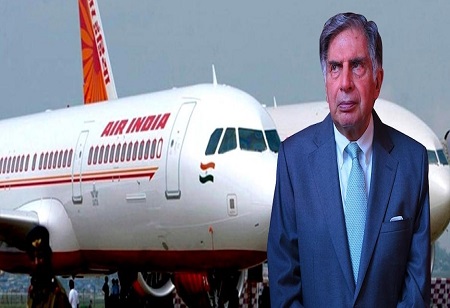Tata Sons - the country’s oldest & largest conglomerate, will take over India’s debt-laden national carrier Air India. Tata Sons’ winning bid of 180 billion rupees (which is USD 2.4 billion) beat India’s SpiceJet’s offer that was 151 billion rupees.
Owing to the result of
Air India privatisation, the Market concentration in the
Indian aviation industry will go high, placing it higher than in telecom. Furthermore, the Tatas, with their three airlines, and IndiGo Airlines will control nearly eighty per cent of those, based on the revenues of Financial Year 2020.
Privatization of any government undertaking has numerous positive outcomes since these undertakings are not highly efficient in their operations, most of the time, and due to the numerous constraints as well as challenges owing to its government ownership. While privatization renders better efficiency along with a better business proposition, a private organization is often well-run based on commercial decisions and this helps in ensuring better usage of resources for the consumers’ benefit.
And in this instance, Air India will now be in a position to utilize the aviation bilateral rights with other countries, in a better way, therefore, international travellers will be in a position to travel more efficiently to numerous locations directly rather than traveling through another country.
With a reduced burden of losses, privatization is an advantage for the government, and specifically for Air India, because the borrowings were too high & were only increasing every day. And, unfortunately, the country couldn’t have afforded this borrowing cost for too long.
Not just that, after experiencing the merits and benefits of privatization of the airlines, it is anticipated that the general public would render support towards similar projects and it will be enhanced.
However, the biggest advantage of this privatization among the others is the impact that it can create on the economic growth of the country coupled with infrastructure creation & job creation. A positive market is highly imperative for economic growth as it not only becomes the renderer of much-required equity capital to the industry but reducing the overall cost of capital as well.
Sale of Air India - an “important milestone” in India’s privatization efforts
The International Monetary Fund on Oct 18th, 2021, stated that “the sale of national carrier Air India will constitute an “important milestone” in India’s privatization efforts”. Having emerged as the winning bidder for Air India, Tata Group was issued a letter of intent on October 11.
"We welcome the recent agreement on the sale of Air India, which constitutes an important milestone," Alfred Schipke, Director of IMF-STI Regional Training Institute and a former IMF India Mission Chief, told PTI in an interview.
The government of India accepted an offer to pay Rs 2700 crore cash and takeover Rs 15300 crore of Air India’s debt, by Talace Pvt Ltd, a unit of Tata Group, earlier this month. Once the Tatas accept the letter of intent, the share purchase agreement - for the sale will be signed and along with Air India, the Tatas will also acquire low-cost carrier Air India Express and Air India’s fifty percent stake in equal joint venture AISATS.
"In general, to maximize the benefits from privatization, the international experience highlights the importance of medium-term privatization plans, solid regulatory frameworks, competitive markets, and the buy-in of key stakeholders," Schipke said as the IMF released its annual report on India.
Speaking about the end of years of struggle to privatize the financially troubled airline, the government of India recently stated that Tata Sons will resume control of Air India after bidding USD 2.4 billion, which includes equity & debt. The sale of the loss-making airline will be a huge victory as it had cost taxpayers an average of nearly USD three million per day for the past decade. It would also make India a fully market-driven economy.
“Talace Pvt Ltd, a unit of Tata Sons - the holding company for the autos-to-steel Tata conglomerate which owns luxury carmaker Jaguar Land Rover - will acquire 100% of Air India,” stated Tuhin Kanta Pandey, secretary of the Department of Investment and Public Asset Management.
Finally, a significant event like this privatization will boost the overall sentiment in the capital markets and one such is the big fillip that our markets received after the ‘1991 economic reforms’ amidst a weak economic situation.
The privatization of Air India will not only be a significant booster for the enterprise, but also for the overall economy, industry, markets, and most importantly for the government to keep pushing the important reforms agenda.
